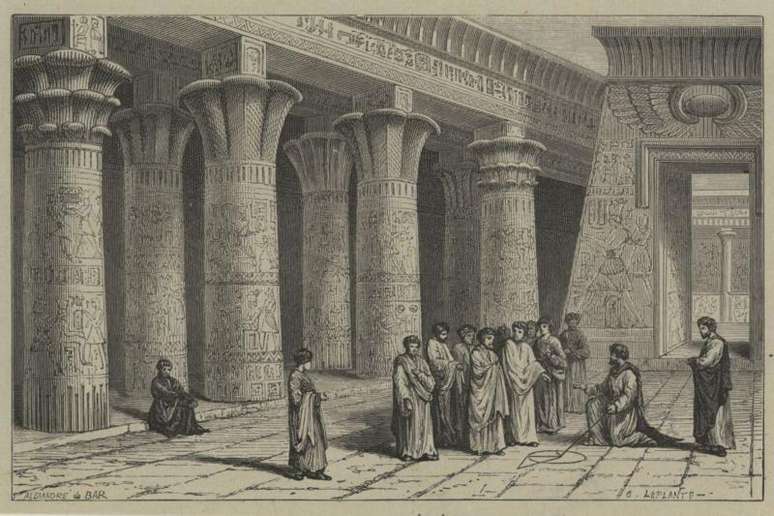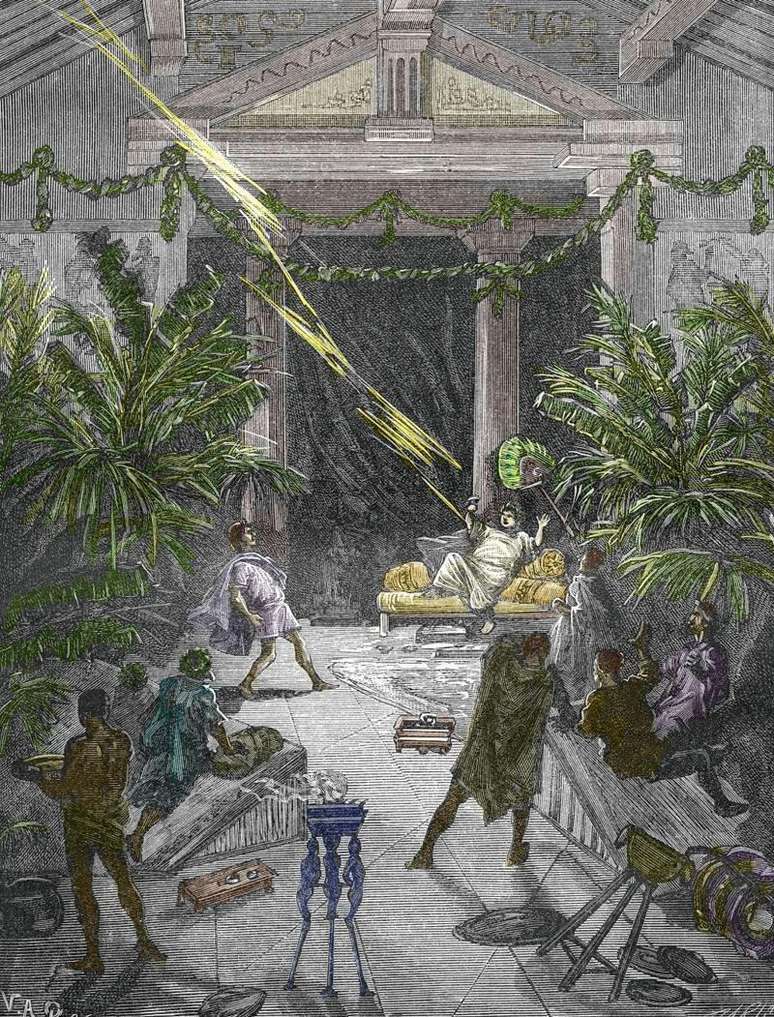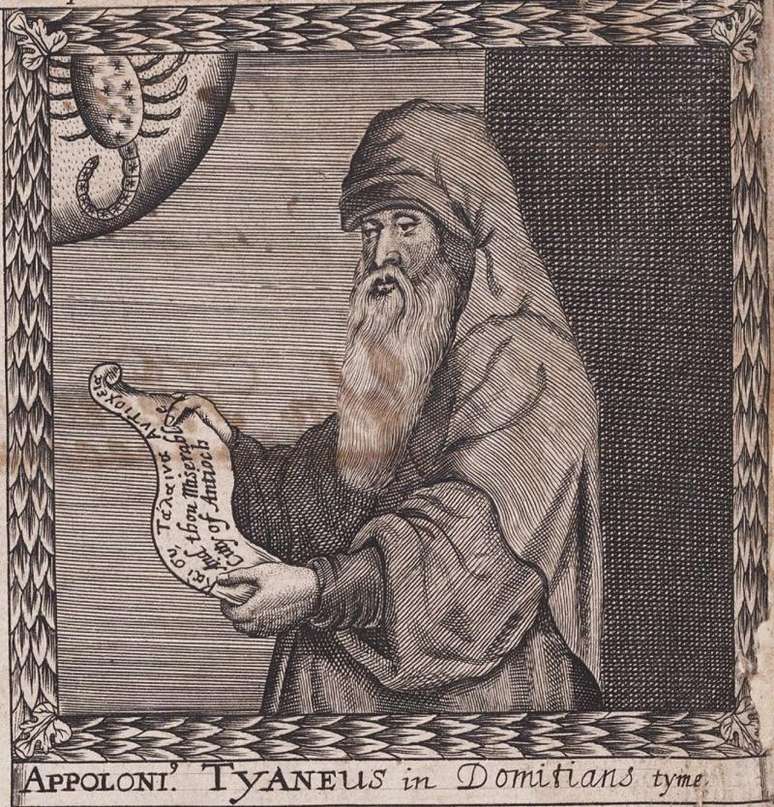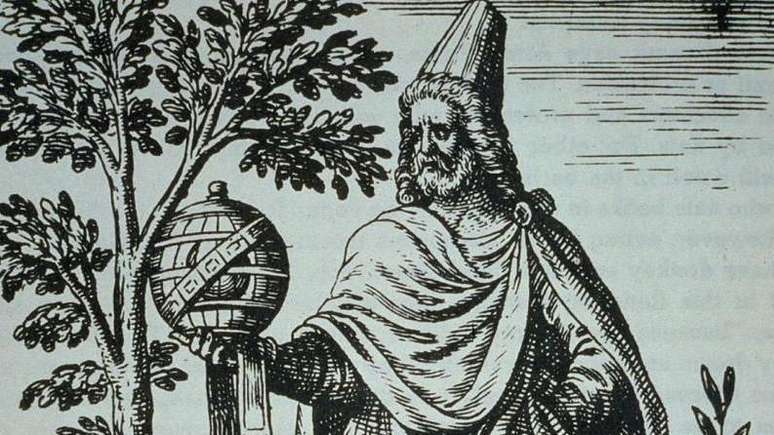Much of what is said about him is similar to what is said about Jesus Christ, who was his contemporary.
During the 1st century AD, in the Eastern Roman Empire, an attractive man with a beard and long hair often dressed in a linen tunic and attracted crowds wherever he went.
Some approached him because they knew of his birth under miraculous circumstances, or because his charisma invited people to listen to his teachings. He appealed to people to live for the spiritual side and not for the material side.
He also healed the sick, exorcised demons and even resurrected the dead.
His disciples were convinced that he was a divine being. But he also had enemies, who handed him over to the Roman authorities and put him on trial.
At the end of his earthly life, he ascended to heaven, but returned to show the faithful that he continued to live in the celestial kingdom.
We are talking about Apollonius, descendant of a rich and ancient family originally from the Greek city of Tyana, in Cappadocia – today Kemer Hisar, in Turkey.
Much of what is said about him is similar to what is said about Jesus Christ, who was his contemporary. So much so that it has been argued, for centuries, about which story he borrowed details from the other, without reaching a consensus.
It is not uncommon to observe that creeds are inspired by each other and borrow some elements and even divinities, especially in that time and in those places, where different cults coexisted and figures such as Jesus and Apollonius proliferated.
Perhaps most relevant here is that these similarities were used to draw comparisons between the two, at a time when Christianity was growing in size and power, before its impending domination.
Apollonius was presented as an alternative to Jesus for people who feared the extinction of ancient beliefs and to prevent the advancement of Christianity.
The Neoplatonic philosopher Porfírio, in his work Averse Christians (“Against the Christians”, in the free translation), questioned the divinity of Jesus Christ and assured that the actions of Apollonius were similar.
Subsequently, the philosopher and governor of Bithynia (now part of Turkey) Sosianus Hierocles presented Apollonius as proof that Christians should not claim the divinity of Christ on the basis of his miracles.
As a result of debates between Christians and pagans, the legend of Apollonius regained its popularity two centuries after his death, according to writer and philosopher Keven Brown.
“The cult in the temple of Aesculapius at Aega, where Apollonius served as a healer of bodies and souls, began to flourish again (like many other temples built in his honor), until Emperor Constantine ordered its destruction in 331 AD,” he says Brown.
But this would not be the last time Apollonius would be the subject of controversy. In fact, it still causes controversy today.
But what do we know about Apollonius?
‘Based on a true story’

To be honest, we don’t know much about it.
The only surviving source that provides a complete account of his life is his biography The life of Apollonius of Tyanawritten by the Greek sophist philosopher Philostratus of Athens.
The Syrian empress Julia Domna, wife of Septimius Severus, commissioned the work in 217 AD and it was completed in 238 AD
Philostratus claims to have written based on material collected in the cities and sanctuaries dedicated to Apollonius, as well as on what had been written about him – such as a book on his youth, by the philosopher Maximus of Tire – and a set of letters written by Apollonius himself .
“But I obtained my most detailed information from a… man named Damis who… became a disciple of Apollonius and left an account of his master’s travels, claiming to have accompanied him, as well as an account of his passages, speeches and predictions…”, writes Filostrato.
Experts have cast doubt on much of the philosopher’s text, including the existence of Damis, which some believe was invented by the author.
But the consensus is that Apollonius existed, as other ancient writers also mention him. And while there aren’t many of them, they include the respected Roman historian Dio Cassius, a contemporary of Philostratus.
The question is this The life of Apollonius of Tyana It reads like a novel that, if published today, would receive the familiar “inspired by a true story” notation.
Philostratus’ narrative is intertwined with legends, such as the one according to which, when Apollonius’ mother was pregnant, a divine being appeared to her.
“She wasn’t scared, but she asked what the baby she would have would be like,” the author reports. “And he replied, ‘Like me.’ ‘And who are you?’ she asked. ‘Proteus, the god of Egypt.'”
Philostratus says that “the people of the country affirm that, at the exact moment of birth, the lightning seemed to fall to the earth and then rise into the air and disappear upwards; and I believe that the gods indicated by this the great distinction to be achieved by man wise.”
But the author takes pains to portray Apollonius as a scholar rather than a god. He could do what other mortals could not, according to Philostratus, because of “the knowledge which God reveals to the wise.”
After recounting one of his most famous miracles – the resurrection, on the day of his burial, of a girl from an important Roman family who died during marriage -, Philostratus comments:
“Whether he saw in her some spark of life, of which those who cared for her had not noticed – in fact it is said that, although it was raining at that moment, a vapor rose from her face – or whether life was really extinguished and restored with the warmth of your touch is a mysterious problem that neither I nor those present have been able to solve.”
wandering sage

Now that we know the origin of the known details of Apollonius’ life, we can go back to the story of when he was 16 years old and decided to live by the strict rules of the Pythagorean school.
As other defenders of Neo-Pythagorean philosophy did, he grew his hair and beard.
Apollonius did not drink wine or eat meat, as he condemned animal sacrifice, particularly as an offering to the gods, as highlighted by the British orientalist Frederick Cornwallis Conybeare (1856-1924), who translated The life of Apollonius of Tyana in English.
Therefore, he did not wear leather shoes and wore only linen clothes, since for him it was unclean for the skin of a dead animal to come into contact with a person.
Apollonius defended a simple and ascetic life like the one he led. He also supported chastity.
He believed in a supreme God, who could be reached through reason and meditation, not through prayer, ritual or sacrifice. But he accepted all creeds as different expressions of one universal religion.
In addition to being a mystic, Apollonius was a mathematician and scientist, who endorsed the idea that the Earth revolves around the Sun. He was a politically active philosopher and fought against tyranny.
According to Philostratus he knew all languages without ever having learned them, he knew the most intimate thoughts of silent people and he understood the language of birds and animals.
Apollonius also had the power to predict the future, not because he was a sorcerer, as some said. His biographer refutes this accusation.
The reason, according to Philostratus, was his “true wisdom, which he practiced as a wise and sensible man” – in the same way as Socrates and Anaxagoras, who also “knew things in advance”.
All these faculties allowed Apollonius not only to heal the sick, but also to free entire cities from plagues. These facts were interpreted as miraculous, but the biographer guarantees that they were the consequence of his scientific knowledge.
When he went to the city of Egas, Apollonius installed himself in the temple of Aesculapius. He soon acquired a reputation for holiness, so much so that the sick turned to him, asking him to cure them.
Having come of age, Apollonius handed over his inheritance to his relatives and decided to spend five years in complete silence, crossing Asia Minor without ever opening his mouth.
The vow of silence further highlighted his reputation for sanctity. According to Conybeare, his mere appearance on the scene was enough to silence the noise of the warring factions in Cilicia and Pamphylia (regions that are now part of Turkey).

Apollonius traveled extensively. In India, he learned from the Brahmins. In Egypt he met the gymnosophists, or naked philosophers.
In Alexandria he held long conversations with the emperor Vespasian and also with his successor Titus, shortly after the attack and capture of Jerusalem.
In Rome Apollonius provoked Nero’s anger. His minister Tigellinus, to whom the emperor had granted “the power of life and death”, began to spy on him, suspecting Apollonius of “ridiculing the government”.
He was saved thanks to an eclipse accompanied by thunder and clairvoyance: “a great event will and will not happen”.
Initially no one understood the meaning of Apollonius’ words. But it was learned, three days later, that Nero was eating during the eclipse, when “lightning fell on the table and broke the cup he was holding in his hands near his lips in two”.
For the emperor, narrowly escaping death gave meaning to Apollonius’ words: “A great event should happen, but it should not happen.”
After learning what had happened, Tigellinus began to fear Apollonius as a wise man in supernatural matters. She felt it would be best not to press charges against him.
But Apollonius was not so lucky after Titus’ death. He was arrested by Emperor Domitian, accused of encouraging rebellions.
Filostrato seems to have carefully reconstructed the trial scene, but its ending is magical: Apollonius disappears from the court “in a divine and inexplicable way”.
The historian Eusebius of Caesarea narrates the episode in his Treaty against the life of Apollonius of Tyana:
“…he was brought to trial before the Emperor Domitian and we read that he was acquitted of the charges and, after being acquitted, with curious impertinence, in my opinion, he shouted in court exactly the following:
«Give me also, if you want, the opportunity to speak; but otherwise send someone to take my body, for my soul cannot be taken. No, you cannot even take my body, for you will not kill me, for I claim that I am not mortal.’
Then, after this famous statement, we are told that he disappeared from the courtroom.”
The details of his life after the trial are vague, but, according to Philostratus, he lived for more than 100 years and retained his vigor and form to the end, appearing even more pleasant than in his youth.
Popular tradition has it that, when he died, he ascended bodily to heaven, accompanied by an unexpected singing of girls’ voices.
Source: Terra
Rose James is a Gossipify movie and series reviewer known for her in-depth analysis and unique perspective on the latest releases. With a background in film studies, she provides engaging and informative reviews, and keeps readers up to date with industry trends and emerging talents.






